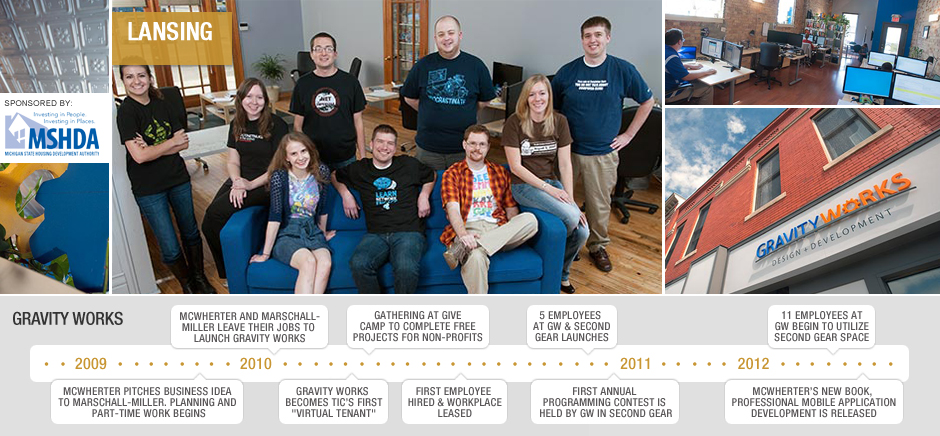Lansing biz brings design and development practice down to earth
The founders of Gravity Works started with two key ingredients: passion and talent. Next came a physical home in Lansing's Old Town and a business plan that included plenty of community engagement.

Co-workers Jeff McWherter and Amelia Marschall-Miller were out to dinner with their spouses in October 2009 when McWherter popped the question.
His wife said, ‘Don’t scare her off! Don’t tell her what you’re thinking!'” recalls Marschall-Miller. What McWherter had veiled as a suggestion to collaborate on a project, was actually a much larger proposition.
“He asked about this project and then a couple of minutes later said, ‘I want to start a company.'”
And he wanted to start it with her, a graphic designer working at the same company where McWherter was a developer.What McWherter and Marschall-Miller didn’t have was an office. When they made the leap to begin Gravity Works fulltime, they looked to East Lansing’s Technology Innovation Center.
“It was seeing how other companies treated their clients and employees,” he says. “I knew that the work I was doing, in many situations, was not valued, and a lot of times the clients weren’t 100 percent happy with how projects were managed.”
McWherter felt that if he spent time working with the clients, delivering them the projects they really wanted, and treated employees like friends, he could have a design and development firm that offered something truly different.
At that time when Gravity Works was just getting off the ground, in fact, simply offering both design and development was unique.
“It’s more common now,” says Marschall-Miller, “but it used to be that you would go to one kind of company or the other, and then they would outsource for the rest of the project.”
McWherter and Marschall-Miller had the skills to do everything in-house and the passion to deliver a great product. What they didn’t have was an office. Though working from home was fine while the two were holding down day jobs, when they made the leap to begin Gravity Works fulltime, they looked to East Lansing’s Technology Innovation Center.
“The TIC was fairly young then,” says McWherter, “so there was big buzz around it, and people liked going there and seeing what was happening.”
This excitement added extra incentive for Gravity Works to benefit from the incubator, but there was no room at the inn, so to speak. So, while they awaited a physical spot to become available, the TIC made Gravity Works their first virtual tenant. While they weren’t utilizing office space, they were still entitled to the conference rooms, trainings and other amenities of the incubator.
“It was great to even have a mailing address that wasn’t one of our homes,” Marschall-Miller says. “We utilized the conference rooms and there were printers, and they offered business planning.”
The boost was just what they needed. While they were still awaiting their space to open up in the TIC, it came time to hire an employee. McWherter and Marschall-Miller knew this was their cue to find a place of their own.
Gravity Works finding a home in a district known for community engagement ended up being an appropriate fit for the firm that had already begun to incorporate community outreach into its business.
“Jeff was the one who brought Give Camp to Lansing,” Marschall-Miller says.
Lansing Give Camp crams developers in one room for a weekend to crank out valuable services for nonprofits for free. Gravity Works has partnered with Impression 5, TechSmith and others on the project.
Give Camp is now an annual event in Lansing, as is Gravity Works’ Annual Programming Contest. The firm has participated in Old Town Commercial Association efforts and has even found a way to make its office a destination for user groups in need of meeting space.
“We knew that Gravity Works was growing and we were going to need more space,” McWherter says. “Eventually we knew we were going to use it, but thought, why don’t we start hosting user groups and giving people a place to work during the day?”
While they are no longer unique for combining design and development, Gravity Works still strives to stay ahead of every curve. At a time when other firms are just beginning to start thinking mobile, for example, a full third of Gravity Works’ business is now mobile app development.
“Some people are afraid of new technologies,” Marschall-Miller says. “Jeff’s not afraid to try anything. Nobody was an expert at mobile developing when it first started, but he started experimenting and started coming out with good mobile apps.”
Did the experimenting help? Well, McWherter just literally wrote the book on mobile app development (his Professional Mobile Developing is now available in stores), so that seems like a “Yes.”
Because that’s what they do. And whatever the horizon beyond mobile apps turns out to be, Gravity Works will undoubtedly be writing the book on that before the rest of us are aware it exists.















